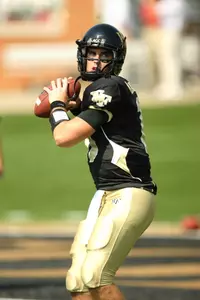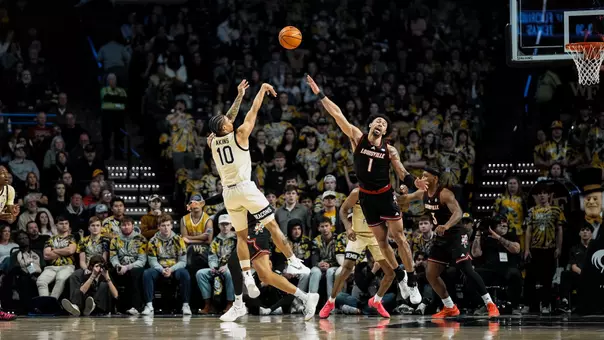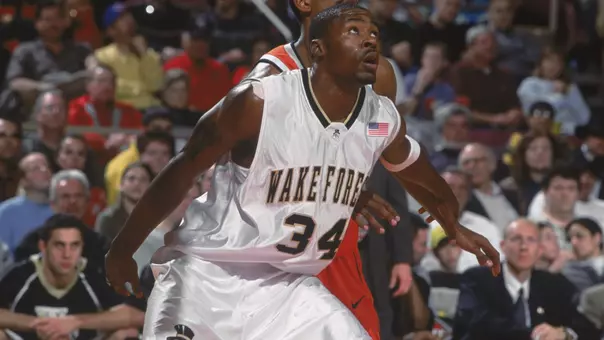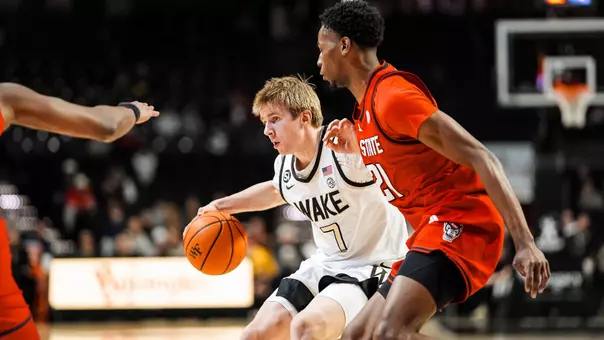Wake Forest Athletics

Prosser Comments On Past And Future
4/22/2004 12:00:00 AM | Men's Basketball
April 22, 2004
You can bring up all the numbers you want - a 21-10 record, the first trip to the Sweet 16 in seven years - but the strides Wake Forest took this season can be summed up this way: when the Deacons lost in the NCAA regional semifinals to St. Joseph's, a No. 1 seed who was favored to go all the way to the Final Four, it still felt like the season was done too soon. Coach Skip Prosser talked with Gold Rush's Jay Reddick about the season just past and the exciting times ahead.
Gold Rush: Let's start at the end. The team got back to the Sweet 16 for the first time since 1997, which certainly must be seen as a positive for the program.
Prosser: There's two ways of looking at it: half full or half empty. Our goal is not the Sweet 16, our goal is the Final Four. But we hadn't been to the Sweet 16 for quite some time, and for our kids to get up off the canvas after we lost four in a row and six of eight... There's about 326 teams (in Division I). 310 others would have loved to be where we were. It's not our ultimate destination, but we hope that whets the appetites of our players and our desire to go further.
Gold Rush: Going into your last game, despite St. Joseph's status as a top seed, there were many pundits thinking the Deacons might even be a better team than the Hawks.
Prosser: People sometimes get wrapped up in levels of conference or levels of program. I don't think there is such a thing. I think there are, in fact, levels of players. (Delonte) West and (Jameer) Nelson could have played for any school in the country. We're not happy we lost to St. Joe. We're disappointed we didn't do more, especially defensively, to beat St. Joe. But they are a very good team.
Gold Rush: The team seemed to be very streaky during the year.
Prosser: I think that was not atypical in our league. The league was so strong, it was tough to have any kind of sustained success. Georgia Tech, who went to the ultimate game, at one time they were 6-7. That was endemic of or conference. We won six in a row within the conference, and I don't know if anyone else did that ... maybe Duke.
During the bad times, I give our players a lot of credit for hanging in there when there were a lot of people breaking their ankles by jumping off the bandwagon. We tried to maintain perspective. When we lost that four in a row it was at Texas, a Sweet 16 team; it was at Duke, a Final Four team; we lose to Georgia Tech at home, who ended up in the ultimate game; and we lose at Florida State, who went 15-3 at home. We're still a good team, we just played a tough schedule, and I was glad our players believed that.
Gold Rush: What major adjustments were made through the year during the bad stretches?
Prosser: We tried a lot of different things. Obviously, we weren't going to stand pat while we were losing. We went big, we went small, we went halfway in between, and the one thing that was consistent about our team was our inconsistency. I don't know why that was the case, but it was. I don't think we ever got into a comfortable flow, or substitution rotation, but we tried different things because we were disappointed with how we were playing.
Gold Rush: Were you looking for the hot hand from game to game?
Prosser: Not necessarily the hot hand, but somebody who could stop somebody, or rebound the ball.
Gold Rush: Finding a rotation when you had so many players to choose from probably made it more difficult, but it's also a nice problem to have.
Prosser: It's like a watch. The more moving parts you have, the more chance for a breakdown. Duke essentially played six and a half guys all year, and Georgia Tech played nine. I don't think there's any one way to skin the cat.
Gold Rush: The three-guard lineup got lots of attention early in the year.
Prosser: I think it got mixed reviews. From an offensive standpoint, we were second in the country in scoring, so we had the ability to score baskets, but sometimes that lineup hurt us on the backboard and wasn't as effective defensively. Sometimes you pick your poison. If you're making your shots, maybe you can outscore people. I think that's what happened early in the season on our 11-0 run: we were outscoring people, then when things got a little tighter, teams took away our transition game, and we weren't nearly as consistent on defense.
Gold Rush: When you get in those situations where you "pick your poison," are you comfortable consistently trying to outscore people?
Prosser: No. I think in the long run - the St. Joe game is evidence. We score 80 points and lose. It shouldn't be that way.
Gold Rush: What is next year's team going to look like?
Prosser: We would like to get into a rotation of playing four or four and a half post forwards. I think next year's team has the ability to have a big, strong front line with some experience, with Vytas (Danelius) and (Jamaal) Levy being seniors, Eric (Williams) and Chris (Ellis) being juniors, and Kyle (Visser) with a year under his belt. We could safely play some big, strong guys in that front line.
This year, because of our inconsistency, we ended up playing Levy a lot more at the four (power forward) than we would like. We're certainly a better rebounding team, and probably a better defensive team, if he's at the small forward.
Gold Rush: Where does that leave the backcourt?
Prosser: It's far too early to say with any certainty. All three of those guys had some tremendous moments, including Taron Downey. His selflessness set the stage for our team. Instead of pouting about only starting once in a while, his work ethic in practice was very, very good. He has one more year to play, and his approach will be very critical.
Gold Rush: Bringing the defense back up to par has to be a goal for next year.
Prosser: We will guard much better next year. That's not a variable, not a question mark, it has to become a reality.
Gold Rush: Does that start in the halfcourt or in the press?
Prosser: I think it has to start in the players' psyche. That's a function of coaching. It needs to become infinitely more disturbing if we're scored upon.
Gold Rush: Is this the offense you envisioned when you came here three years ago?
Prosser: I still don't think we're pushing it as hard. Our fast breaks have to become five-man fast breaks. At times, we were running it like we'd envision but not for 40 minutes and not all five guys.
Gold Rush: Vytas Danelius' playing time fluctuated a lot throughout the year. He had some injury problems, but what do you need out of him this offseason?
Prosser: This is a hard game to be really good at. In order to be really good at it, your preparation has to be really good. Vytas, because of injuries and ailments, did not have a productive spring, did not have a productive fall. Hence, he was behind once the season started, and then he became injured.
Not unlike Chris Ellis, he was in a catch-up mode throughout the season. That led to inconsistency where he'd have games like he had up at Maryland, against Manhattan, but not to the extent we were used to seeing as a sophomore.
It behooves him and would benefit us greatly if his preparation for this season is radically different. I think he is determined to do that; he doesn't want to fall off the face of the Earth after being a preseason All-ACC pick.
Ideally, Taron, Lev and Vytas will be gripped by that sense of desperation with one year left, to want to end their careers on a positive note.
Gold Rush: What other individual improvements are you hoping to see?
Prosser: This is a really big offseason for several of our guys. We have to get bigger and stronger. We have players who have individual weaknesses that they need to work on, and we're trying to impress on them the urgency of the situation.
Gold Rush: With the same group coming back, how do you avoid falling back into the same routine?
Prosser: You'd like for it not to be that way, but I think you'd be hard-pressed to find too many teams that didn't go through ups and downs. I don't think we can look all that globally at next season; we just have to focus on this spring, then this summer, then this fall, but how we prepare for that is going to be vitally important.
Gold Rush: Expectations are going to be that much higher. Sports Illustrated picked you as its preseason No. 1 team for next season. How will you deal with that?
Prosser: It doesn't affect us. Three years ago, when we got here, we wanted to build something special. We wanted Wake Forest to be known nationally, to be loved locally - even to the point we wanted 1,000 kids to come to camp so we could get 1,000 Wake Forest T-shirts on kids' backs. We wanted to excite people so they would want to come to the Joel, then give them a sensory and basketball experience so good that they would want to return. We wanted to become relevant in the ACC and become a consistent participant in the national tournament. If expectations are high, that's a by-product of what we have been able to accomplish these last three years.
But that cannot enter into our thinking every day in the weight room, every day of individual improvement and every day once practice begins. While Connecticut was a wire-to-wire winner, look at Oklahoma, look at Marquette. Teams with very high preseason expectations, and they didn't even make the tournament. You cannot run away from those expectations, but they are meaningless once the ball starts bouncing.
Gold Rush: Is the atmosphere at the Joel where you want it to be?
Prosser: No. I have no history of crowd hysteria at the Joel. Others tell me the atmosphere is the best it's ever been for certain games. Our students, our marketing staff and the Wake faithful have been tremendous, from the tie-dyed shirts to the motorcycle. But there's another whole level of hysteria that we'd like to get it to. I think it would be great if every game had the same big-game buzz, and that's doable.
There has to be a sense of ownership in the city, and we have to excite the local populace to come to every game. And we're not going to see Wake play Carolina, or Wake play Cincinnati, we're going to see Wake Forest play. That is the ultimate.
That being said, if the team isn't competitive, you can have all the Ringling Brothers, Barnum and Bailey you want, but people will gradually quit coming.



